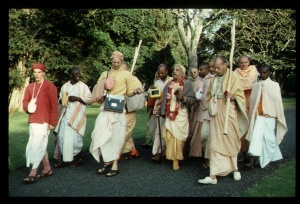CC Madhya 24.169: Difference between revisions
m (1 revision(s)) |
No edit summary |
||
| Line 1: | Line 1: | ||
{{ | [[Category:Sri Caitanya-caritamrta - Madhya-lila Chapter 24|C169]] | ||
<div style="float:left">'''[[Sri Caitanya-caritamrta|Śrī Caitanya-caritāmṛta]] - [[CC Madhya|Madhya-līlā]] - [[CC Madhya 24|Chapter 24: The Sixty-One Explanations of the Atmārāma Verse]]'''</div> | |||
<div style="float:right">[[File:Go-previous.png|link=CC Madhya 24.168|Madhya-līlā 24.168]] '''[[CC Madhya 24.168|Madhya-līlā 24.168]] - [[CC Madhya 24.170|Madhya-līlā 24.170]]''' [[File:Go-next.png|link=CC Madhya 24.170|Madhya-līlā 24.170]]</div> | |||
{{CompareVersions|CC|Madhya 24.169|CC 1975|CC 1996}} | |||
{{RandomImage}} | |||
==== TEXT 169 ==== | ==== TEXT 169 ==== | ||
<div | <div class="verse"> | ||
tasyaiva hetoḥ prayateta kovido | :tasyaiva hetoḥ prayateta kovido | ||
na labhyate yad bhramatām upary adhaḥ | :na labhyate yad bhramatām upary adhaḥ | ||
tal labhyate duḥkha-vad anyataḥ sukhaṁ | :tal labhyate duḥkha-vad anyataḥ sukhaṁ | ||
kālena sarvatra gabhīra-raṁhasā | :kālena sarvatra gabhīra-raṁhasā | ||
</div> | </div> | ||
| Line 14: | Line 18: | ||
==== SYNONYMS ==== | ==== SYNONYMS ==== | ||
<div | <div class="synonyms"> | ||
tasya | ''tasya eva''—for that; ''hetoḥ''—reason; ''prayateta''—should endeavor; ''kovidaḥ''—one who is learned and intelligent; ''na''—not; ''labhyate''—is achieved; ''yat''—that which; ''bhramatām''—of those wandering; ''upari adhaḥ''—up and down; ''tat''—that; ''labhyate''—is achieved; ''duḥkha-vat''—exactly like unhappiness or distress; ''anyataḥ''—from other reasons (one’s past actions); ''sukham''—happiness; ''kālena''—by time; ''sarvatra''—everywhere; ''gabhīra''—insurmountable; ''raṁhasā''—having force. | ||
</div> | </div> | ||
| Line 21: | Line 25: | ||
==== TRANSLATION ==== | ==== TRANSLATION ==== | ||
<div | <div class="translation"> | ||
"'The transcendental position cannot be attained by wandering up and down from Brahmaloka and Satyaloka to Pātālaloka. If one is actually intelligent and learned, he should endeavor for that rare transcendental position. By the force of time one attains whatever material happiness is available within the fourteen worlds, just as one attains distress in due course of time. But since spiritual consciousness is not attained in this way, one should try for it.' | |||
</div> | </div> | ||
| Line 28: | Line 32: | ||
==== PURPORT ==== | ==== PURPORT ==== | ||
<div | <div class="purport"> | ||
This verse was spoken by Nārada Muni in Śrīmad-Bhāgavatam ([[SB 1.5.18]]). Nārada Muni was speaking to Vyāsadeva, who was morose even after he had compiled all the Vedic literatures. In this connection, Nārada Muni advised Śrīla Vyāsadeva to try to attain devotional service and nothing else. | This verse was spoken by Nārada Muni in [[Srimad-Bhagavatam|''Śrīmad-Bhāgavatam'']] ([[SB 1.5.18]]). Nārada Muni was speaking to Vyāsadeva, who was morose even after he had compiled all the Vedic literatures. In this connection, Nārada Muni advised Śrīla Vyāsadeva to try to attain devotional service and nothing else. | ||
</div> | </div> | ||
__NOTOC__ | |||
<div style="float:right; clear:both;">[[File:Go-previous.png|link=CC Madhya 24.168|Madhya-līlā 24.168]] '''[[CC Madhya 24.168|Madhya-līlā 24.168]] - [[CC Madhya 24.170|Madhya-līlā 24.170]]''' [[File:Go-next.png|link=CC Madhya 24.170|Madhya-līlā 24.170]]</div> | |||
__NOTOC__ | |||
__NOEDITSECTION__ | |||
Revision as of 12:29, 14 September 2021

A.C. Bhaktivedanta Swami Prabhupada
TEXT 169
- tasyaiva hetoḥ prayateta kovido
- na labhyate yad bhramatām upary adhaḥ
- tal labhyate duḥkha-vad anyataḥ sukhaṁ
- kālena sarvatra gabhīra-raṁhasā
SYNONYMS
tasya eva—for that; hetoḥ—reason; prayateta—should endeavor; kovidaḥ—one who is learned and intelligent; na—not; labhyate—is achieved; yat—that which; bhramatām—of those wandering; upari adhaḥ—up and down; tat—that; labhyate—is achieved; duḥkha-vat—exactly like unhappiness or distress; anyataḥ—from other reasons (one’s past actions); sukham—happiness; kālena—by time; sarvatra—everywhere; gabhīra—insurmountable; raṁhasā—having force.
TRANSLATION
"'The transcendental position cannot be attained by wandering up and down from Brahmaloka and Satyaloka to Pātālaloka. If one is actually intelligent and learned, he should endeavor for that rare transcendental position. By the force of time one attains whatever material happiness is available within the fourteen worlds, just as one attains distress in due course of time. But since spiritual consciousness is not attained in this way, one should try for it.'
PURPORT
This verse was spoken by Nārada Muni in Śrīmad-Bhāgavatam (SB 1.5.18). Nārada Muni was speaking to Vyāsadeva, who was morose even after he had compiled all the Vedic literatures. In this connection, Nārada Muni advised Śrīla Vyāsadeva to try to attain devotional service and nothing else.